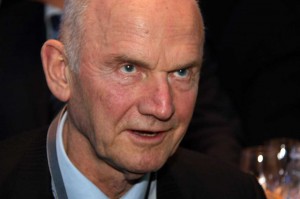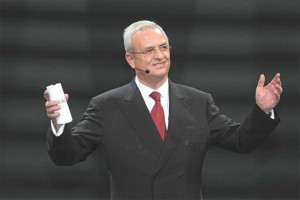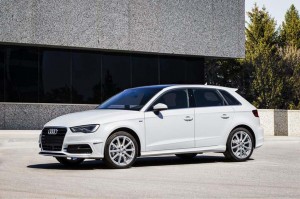
Ferdinand Piech, grandson of the company's founder, resigned as chairman due to a dispute with his successor, Martin Winterkorn.
Volkswagen is forcefully denying claims by its former chairman that other top company managers covered up its diesel emissions scandal.
Questioned during an internal investigation of the affair – which centers around VW’s admission it rigged two high-volume diesel engines to illegally pass emissions tests – former Chairman Ferdinand Piech reportedly told authorities he had advised board members about the subterfuge long before it was publicly revealed. In particular, Piech’s testimony appears to focus on Martin Winterkorn, the CEO forced out of the company in September 2015.
VW, which has long insisted the scandal was the work of a “handful” of lower-level engineers, said in a statement that it has “unequivocally and emphatically rejected all assertions made by Ferdinand Piech as untrue.”
The automaker also said it would “carefully weigh the possibility of measures and claims against Mr. Piech.”
But the revelation that Piech apparently has pointed a finger at his hand-picked protégé and other senior executives could complicate Volkswagen’s efforts to put the diesel emissions scandal behind it. The company last month agreed to settle another outstanding U.S. probe that brings, to date, the cost of the affair to more than $20 billion for the world’s largest automaker.
If Piech’s statements were to prove true, the new twist could potentially leave VW open to further fines and other legal costs, while also subjecting Winterkorn and other managers to the possibility of criminal charges.
(Click Here for more on the Winterkorn probe.)
In January, the U.S. Justice Department included the indictment of six VW employees as part of its criminal settlement with the automaker.
German authorities have made it clear that Winterkorn remains a person of interest as they conduct their own criminal probe. Among other things, they are exploring concerns that he and other top executives knew about the diesel engine rigging earlier than they have acknowledged, hiding the matter as long as possible to avoid hurting the automaker’s stock price.
All told, VW has acknowledged rigging more than 11 million 2.0- and 3.0-liter diesel engines so they would appear to comply with emissions mandates, especially in the United States. In reality, the engines could produce up to 40 times more pollution than legally allowed.
(Latest VW diesel deal could be more costly than expected. Click Here to learn why.)
Piech, an heir to Volkswagen founder Ferdinand Porsche, was recently questioned by prosecutors in the town of Brunswick, where the investigation has been centered.
Piech served as CEO of Volkswagen through much of the 1990s. Elevated to chairman, he named Winterkorn to succeed him. But the close relationship began to fray in 2014, and Piech tried to force out his former protégé. But, in a series of maneuvers, Winterkorn wound up on top in the battle, forcing Piech – as well as his board member wife – to retire.
Several company insiders say they were not shocked to hear Piech making claims about Winterkorn. But they also privately questioned whether such charges could be taken seriously considering the bad blood between the two former Volkswagen executives.
The diesel affair exploded in September 2015, when the U.S. Environmental Protection Agency accused VW of using a so-called “defeat device” to rig the 2.0-liter engine. The automaker subsequently acknowledged the subterfuge and Winterkorn was forced out weeks later.
The company has also acknowledged it was advised of an outside study by the International Council on Clean Transportation on May 23, 2014. While it was delivered to the then-CEO’s office, the company said last March that, “Whether and to which extent Mr. Winterkorn took notice of this memo at that time is not documented.”
It has not been confirmed that the former CEO was personally advised of the problem until a meeting held at VW’s corporate offices in Wolfsburg, Germany on July 27, 2015.
(VW brings updated Atlas SUV to Chicago Auto Show. Click Here to see why it’s aimed at “weekend warriors.”)


